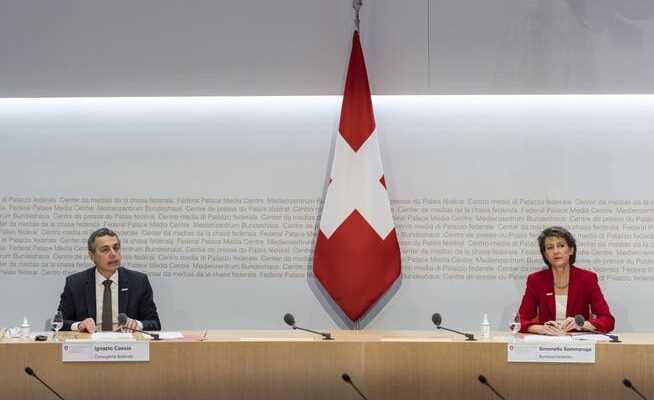The Canadians wanted to transport war material to Italy via Switzerland. The responsible transport minister, Sommaruga, agreed, as did Defense Minister Amherd. But then the State Department got involved.
They got in each other’s way: Federal President Ignazio Cassis and Transport Minister Simonetta Sommaruga at a media conference in October 2020.
The Federal Council has been caught on the wrong foot. It took him several days to sort himself out after the start of the Russian war against Ukraine. After some confusion and even more criticism, a clear decision was made: in this conflict, neutral Switzerland will in principle accept the sanctions of the EU.
But that doesn’t settle everything. The interpretation of neutrality continues to lead to tensions in Bern. According to several well-informed sources, the Federal Council had to deal with a sensitive request from NATO member Canada at its meeting on Wednesday. Or rather, he should have dealt with it. Because shortly before that, the foreign department of Federal President Ignazio Cassis (FDP) had already dealt with the matter “short official channels”, although it is not in charge of this matter.
First things first: Canada wanted to transport war material from England to Italy. To this end, Ottawa has applied to Bern for permission to overflight. The Federal Office for Civil Aviation is responsible for such inquiries. It does not decide on its own, but always consults the Air Force and the Directorate for International Law. This means that three departments and just as many members of the Federal Council are involved: Transport Minister Simonetta Sommaruga (SP), Defense Minister Viola Amherd (centre) and Foreign Minister Cassis. Sommaruga is in charge.
“Secret diplomacy” is met with criticism
Because the question of such overflights has not been clarified, the Minister of Transport brought the matter to the Federal Council. According to consistent information, she has applied for the granting of the permit. Amherd is said to have agreed. Other departments, on the other hand, have raised concerns with reference to neutrality.
When the Federal Council met on Wednesday, the air was already outside. In the meantime, the Department of Foreign Affairs (EDA) had intervened at the Canadian Embassy and asked them to withdraw the controversial request. The Canadians followed the request. They were reportedly told that the chances of their application not being good anyway.
According to the sources, the intervention took place without the knowledge of the department of Sommaruga. The resentment should be correspondingly great. One hears that opponents of the request are also alienated by the “secret diplomacy” of the FDFA.
“Significant political implications”
On March 11, the Federal Council dealt with overflights in the context of the Ukraine crisis. At that time he made two fundamental decisions: Under no circumstances should army aircraft belonging to the parties to the conflict be allowed to use Swiss airspace for military purposes. The same applies to all other states if the overflight serves to provide military support to one of the parties to the conflict. This refers specifically to deliveries of weapons or ammunition. Exceptions are possible for humanitarian or medical reasons, such as transporting the wounded.
The Federal Council left one key question unanswered: What applies to deliveries from one NATO country to another? After all, NATO is not a party to the conflict. According to a CH Media report, Sommaruga and Amherd proposed on March 11 that such requests should be approved in principle. But they didn’t get through with it. From the point of view of the SVP federal councilors in particular, such a concession would not be compatible with neutrality. It was agreed that applications of “significant political importance” must always be submitted to the Federal Council as a whole.
Better to take a detour than wait
However, the actions of the FDFA have now meant that the political weighing of interests in the present case has become obsolete. Other applications are said to have been withdrawn in recent weeks. Apparently, NATO states would rather take detours than wait for the outcome of the neutrality policy debates in Bern.
However, the uncomfortable questions for Switzerland remain unanswered. Shouldn’t the country have a vested interest in NATO being able to maintain its defense posture as efficiently as possible? Proponents also argue with European solidarity in the face of Russian aggression. You can also hear the hint that the ban on overflights is hypocritical because it is about countries to which Switzerland itself exports weapons.
The other side argues that there are controls on exports to prevent the weapons from falling into other hands. However, if a NATO country supplies weapons to Poland, for example, it is possible that they will end up in Ukraine. Therefore, neutrality requires that such overflights be prohibited.
The issue remains difficult. Even the current case is not completely settled with the withdrawal of the application. According to informed sources, the Canadians now want to know officially what the position of Switzerland is.
